
Free service dogs can be a game-changer for individuals with disabilities, but they can be expensive. Organizations that provide free service dogs are a vital resource for those in need.
Service Dogs Inc. is a non-profit organization that provides free service dogs to veterans and first responders with PTSD and other conditions. These dogs are trained to detect and respond to their owner's needs.
Many organizations have specific eligibility criteria for receiving a free service dog. For example, Canine Companions for Independence requires applicants to have a disability that affects their daily life.
Free service dogs can be trained to perform a wide range of tasks, from opening doors to alerting their owners to important sounds.
Worth a look: Psychiatric Service Dog Organizations
Getting a Service Dog
You can get a service dog at a reduced cost from some providers, which is a more affordable option than standard prices. These organizations offer discounted services that can still make a big difference for those in need.
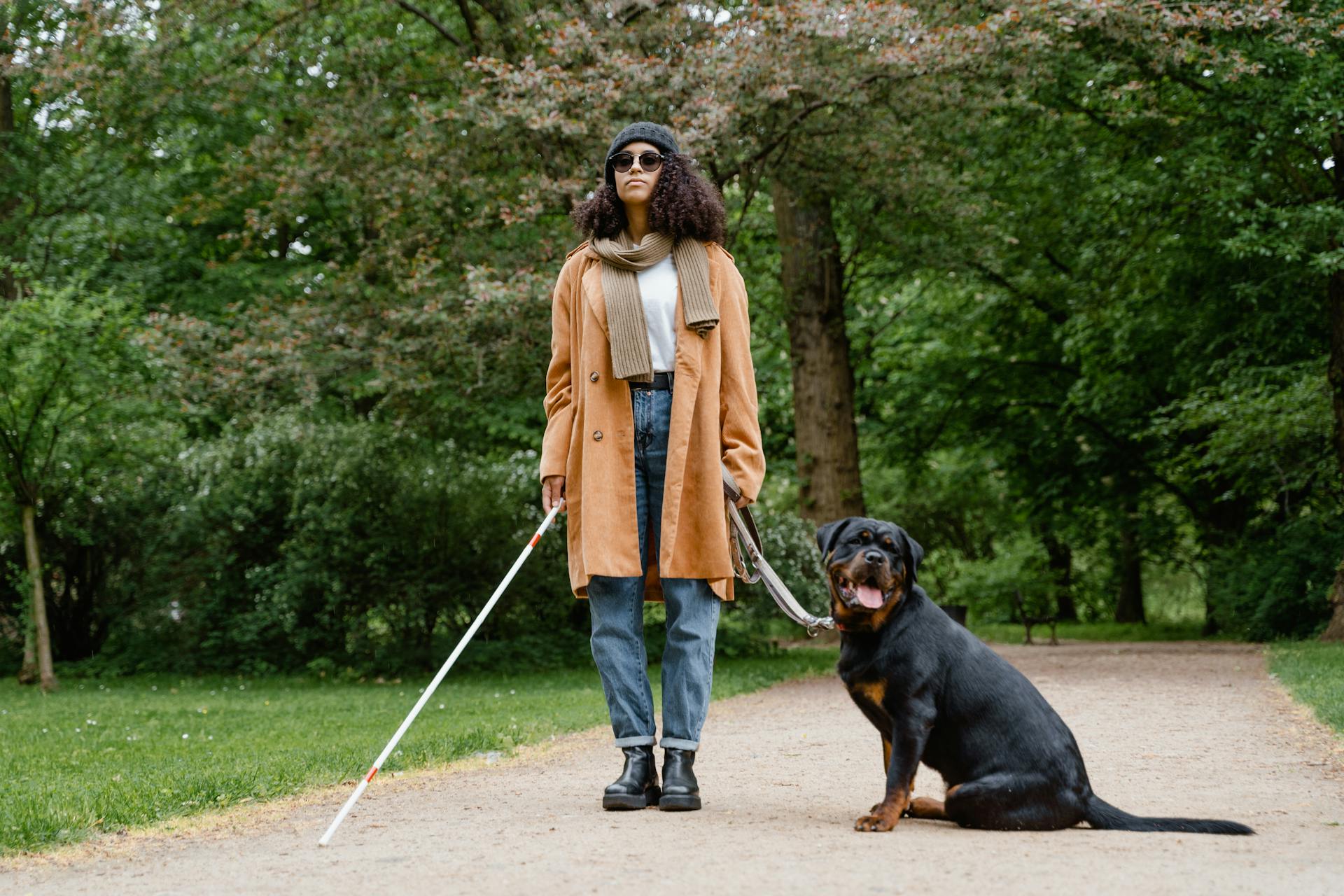
Some organizations offer discounted service dogs, which can be a more affordable option. Complete the Service Dog Flight Request Application on the Miracle Flights website for help.
You can also adopt a dog yourself to train as a service dog, which is often less expensive than purchasing from a breeder. Adopting a dog requires finding a suitable candidate with the right age, temperament, and health.
Dogs from shelters and rescues have potential to be trained as service dogs, and adopting can be a good option. However, it's essential to ensure the dog has the right temperament and capabilities for the job.
Understanding Service Dogs
A service dog is specially trained to perform specific tasks to help an individual with a disability. This training is what sets them apart from companion pets and emotional support animals.
Service dogs have legal privileges to go places where pets typically can't, like in airplanes or certain public areas. This is a key benefit for individuals with disabilities who rely on their service dogs.
Curious to learn more? Check out: Are Husky Dogs Good Family Pets

Here's a quick rundown of the differences between a service dog, companion pet, and emotional support animal:
- A service dog: specially trained to perform specific tasks to help an individual with a disability.
- Companion pet: just a regular pet with no special training or legal designation.
- Emotional support animal: provides comfort and support through companionship, but isn’t trained for specific tasks to assist with a disability.
Distinguishing Companion Pets, Emotional Support Animals, and Service Animals
A companion pet is just a regular pet with no special training or legal designation.
It's essential to understand that a companion pet, an emotional support animal, and a service dog are not the same. This distinction is crucial when looking for an animal to assist with a disability.
An emotional support animal provides comfort and support through companionship, but isn’t trained for specific tasks to assist with a disability.
A service animal is specially trained to perform specific tasks to help an individual with a disability.
Service dogs have legal privileges to go places where pets typically can’t, like in airplanes or certain public areas.
Expand your knowledge: Good Companion Dogs
The Seeing Eye
The Seeing Eye is a remarkable organization that provides service dogs to individuals in need. They offer a monthlong training program at their campus, which includes round-trip transportation and lifetime follow-up services.

To be eligible for a service dog from The Seeing Eye, you must be at least 16 years old. This is a requirement that ensures individuals are physically and emotionally capable of training with the dog.
You'll also need to provide personal references, which can be friends, family members, or colleagues who can vouch for your character. This helps The Seeing Eye assess your suitability for the program.
In addition to personal references, you'll need to have a clean living and working environment. This is essential for the health and well-being of the service dog.
Another key requirement is the ability to walk 1-2 miles per day. This may seem like a simple task, but it's essential for the dog's training and your own mobility.
You'll also need to have a realistic plan for using the dog for daily travel routines. This could involve mapping out your daily commute or thinking about how you'll use the dog to navigate your home.
The good news is that The Seeing Eye is committed to making their services accessible to everyone. They don't turn people away due to financial constraints. Instead, they ask for a contribution of $150 for the first visit and $50 for subsequent visits, with a special rate of $1 for veterans.
If this caught your attention, see: Do Service Dogs Have to Be Registered
Here are the key requirements for applying to The Seeing Eye:
- You must be at least 16 years old.
- You must provide personal references.
- You must be capable of walking 1-2 miles per day.
- You must have a clean living and working environment.
- You must have a realistic plan for using the dog for daily travel routines.
- You must have the emotional, mental and physical capability of training with the dog.
You can apply for a service dog from The Seeing Eye online, or you can call them at (800) 539-4425 or contact them via email.
Helping and Getting Help
If you're in need of a service dog, don't be discouraged by the costs. There are organizations that offer service dogs at a reduced cost, making them a more affordable option for those on a budget.
Some organizations, like PAWS, even provide service dogs for free to eligible individuals with disabilities. To be eligible, you must meet certain requirements, such as having a physical disability or being a child with autism. You can complete the client application on their website between January and March each year.
If you're not eligible for a free service dog, you can also consider applying for grants or crowdfunding to help fund the costs of a service dog. Some non-profit organizations and foundations offer grants for individuals needing a service dog.
Here are some options to consider:
- Grants: Some non-profit organizations and foundations offer grants for individuals needing a service dog.
- Crowdfunding: Many people have turned to platforms like GoFundMe to raise funds for their service dog needs.
How Can I Help?
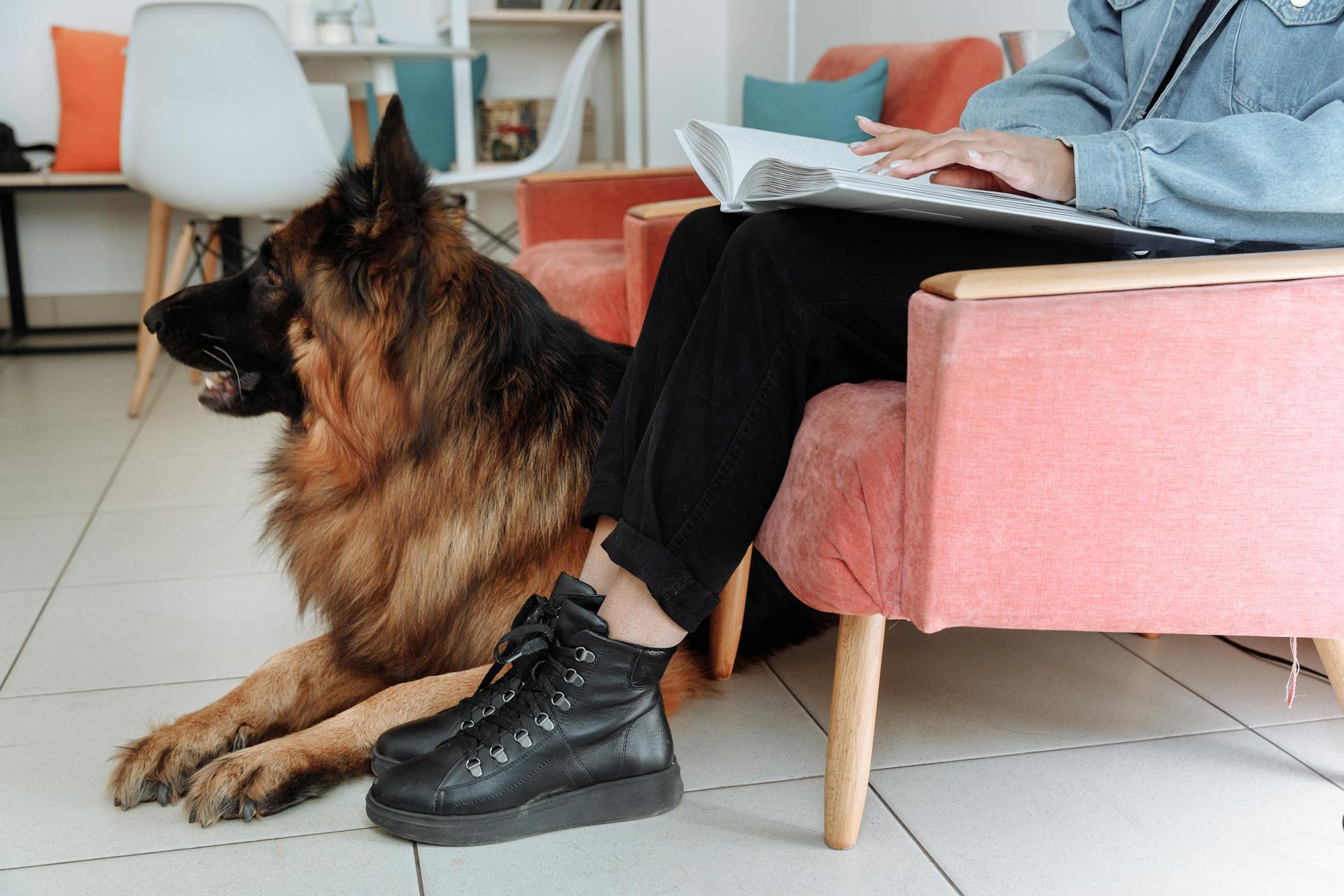
If you're interested in helping individuals with disabilities, here are some ways you can make a positive impact.
You can volunteer to help train service dogs, which are trained assistants that can help with specific tasks, depending on whether someone is blind, deaf, mobility impaired, or living with another disability.
By helping to train service dogs, you can play a crucial role in assisting individuals with disabilities to live more independently and freely.
Some common tasks that service dogs can be trained to perform include guiding individuals with visual impairments through various environments.
You can also consider donating to organizations that provide service dogs to individuals with disabilities.
Service dogs can be trained to perform a wide range of tasks, from activating light switches to reminding their owner to take medication.
Here are some specific tasks that service dogs can be trained to perform:
- Activating light switches.
- Retrieving items such as dropped objects or specific items.
- Opening and closing doors.
- Handling transactions with cashiers.
- Carrying items in a backpack or bag.
- Pulling a wheelchair.
- Pressing buttons for handicap-accessible doors.
- Helping with household tasks like unloading laundry.
By supporting organizations that provide service dogs, you can help individuals with disabilities to live more independently and freely.
Funding and Assistance
If you're in need of financial assistance for a service dog, there are options available. Some health insurance plans, including Medicare and Medicaid, do not cover the costs, so it's best to check with your specific insurance provider.
Many non-profit organizations and foundations offer grants for individuals needing a service dog. These grants can be a game-changer for those who cannot afford the costs on their own.
You can also try crowdfunding platforms like GoFundMe to raise funds for your service dog needs. This has become a popular way for people to raise money for their service dogs.
Here are some options to consider:
- Insurance: Check with your specific insurance provider to see if they cover service dog costs.
- Grants: Look into non-profit organizations and foundations that offer grants for service dogs.
- Crowdfunding: Use platforms like GoFundMe to raise funds for your service dog needs.
Paws for Cause
PAWS with a Cause is a fantastic organization that provides service dogs for free to eligible individuals with disabilities. They're one of the most versatile organizations around.
To be eligible for a service dog from PAWS, you must have a physical disability, hearing impairment, seizure disorder, or be a child with autism. Meeting these requirements is crucial for getting accepted.
For your interest: Patriot Paws Service Dogs

You'll also need to demonstrate how a free service dog would enhance your independence or quality of life. This is a critical step in the application process.
Age limits apply, depending on the type of service dog you need. For example, PAWS only accepts applications between January and March each year.
Inc
Helping and Getting Help: Inc.
Service Dogs Inc. offers a free service dog, but you'll need to pay a nonrefundable $50 application fee. This fee is used to cover the paperwork process.
You'll also need to cover your own travel expenses to get to the training campus near Austin, Texas. This can be a significant cost, but it's worth it for the independence and assistance a service dog can provide.
To be eligible for a service dog from Service Dogs Inc., you must be a Texas resident and have hearing loss or a mobility-related disability. You can apply on their website.
You might enjoy: Does Medicare Cover Service Dogs
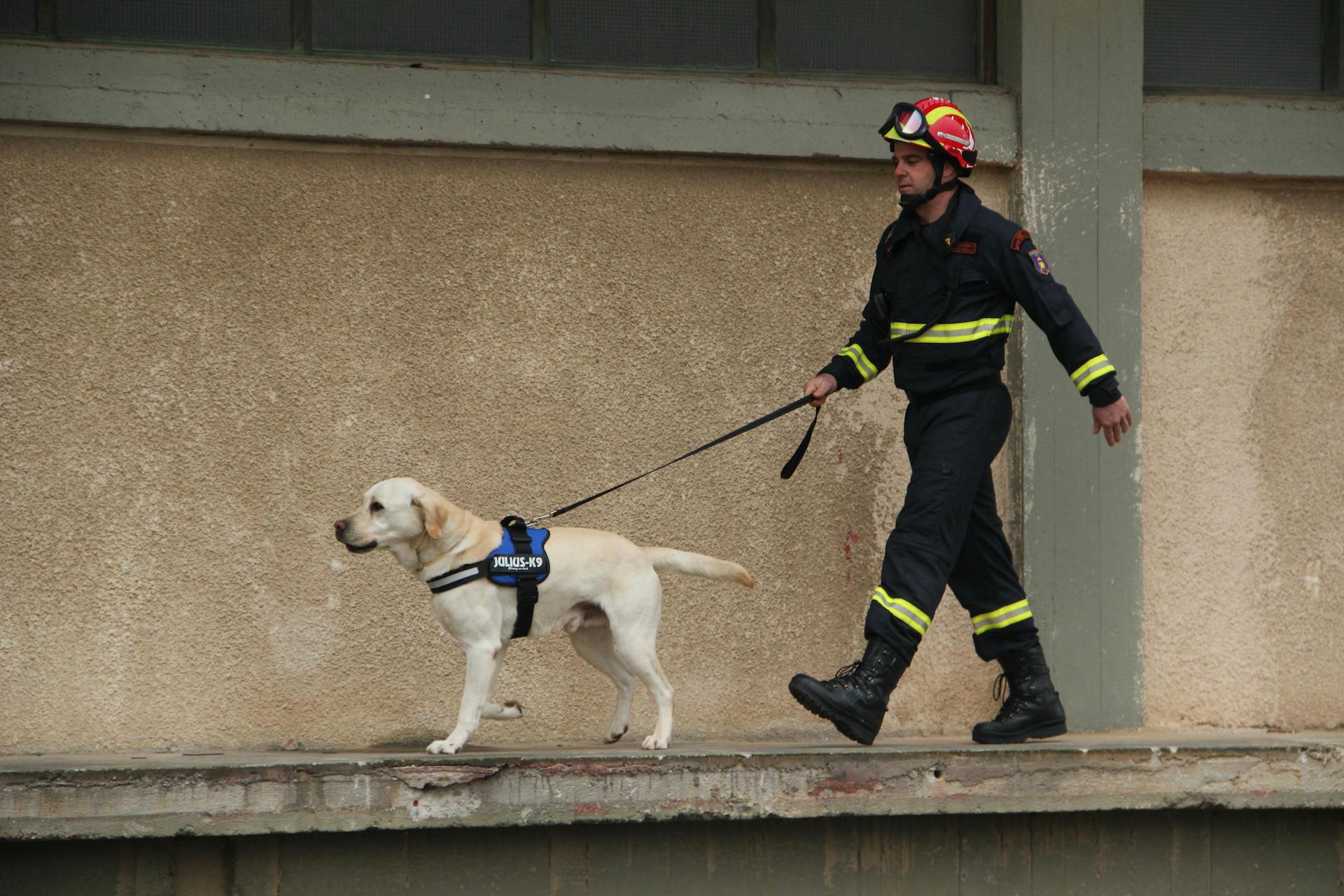
It's worth noting that Service Dogs Inc. has specific requirements for applicants, including not having any other dogs at home. This ensures that the service dog can provide the necessary support and attention.
If you're considering applying for a service dog from Service Dogs Inc., be sure to review their requirements carefully and plan for the travel expenses associated with the training process.
Here are the requirements for Service Dogs Inc. in a quick reference format:
Avoiding Scams and Fees
People looking to get a free service dog should be aware of scams that target individuals in need of assistance. Don't pay to certify or register your service animal.
Under the Americans with Disabilities Act (ADA), service dogs are not required to be certified or registered. This means there is no official government database or certification process for service dogs.
Beware of online offers or websites claiming to provide legitimate certification or registration for service dogs, as these are often scams. They charge people money for certificates or registrations that are completely useless and unnecessary under the law.
Related reading: Hearing Dogs for Deaf People
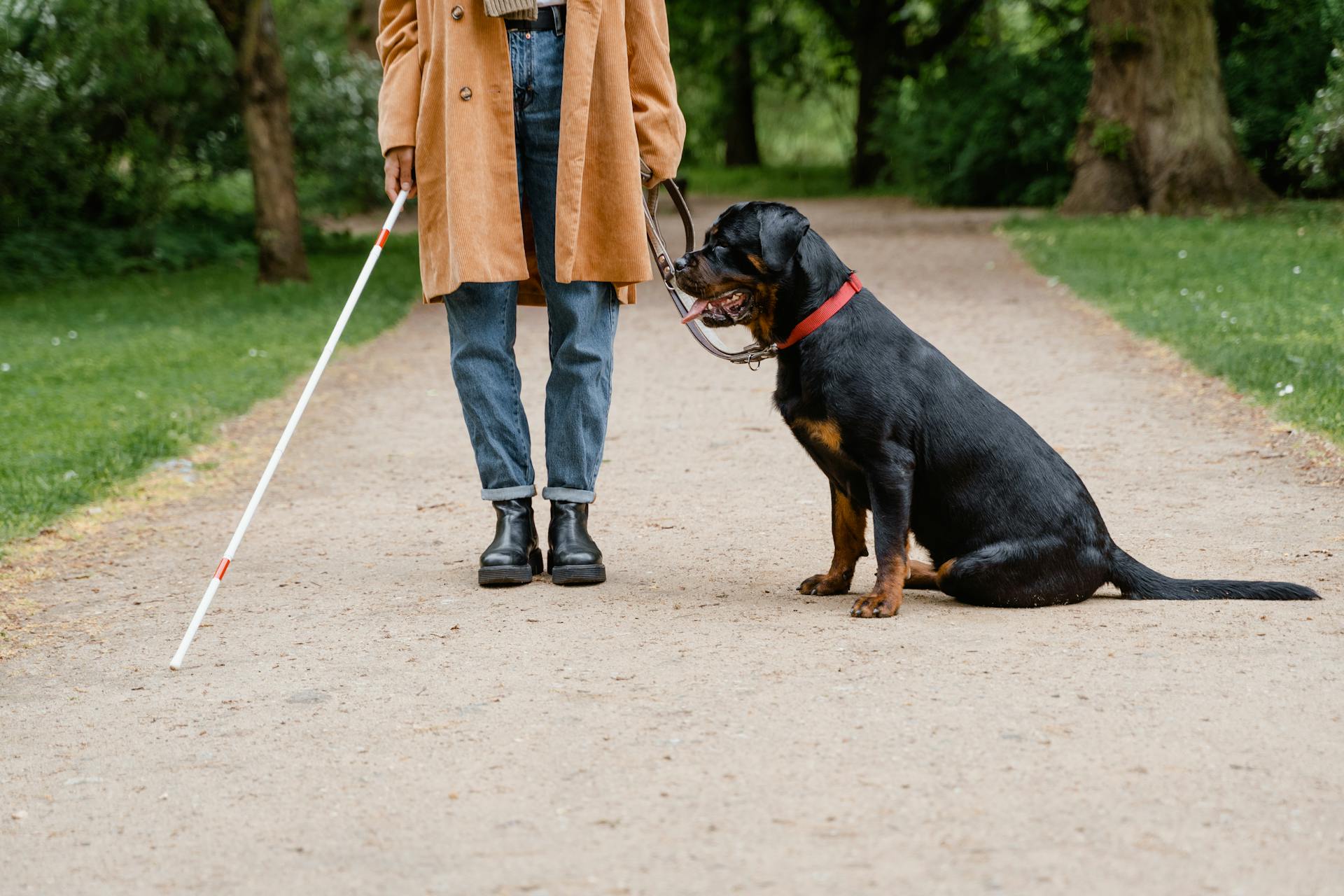
The official ADA website clearly states that organizations and websites that sell animal certifications or registrations online do not convey any rights under the ADA. This means that paying for a certification or registration is a waste of money.
Remember, if you get a service dog for free, you don't need to pay to certify or register it online. Always research thoroughly and consult with reputable service dog organizations to avoid falling prey to these fraudulent schemes.
A unique perspective: Are Psychiatric Service Dogs Covered under the Ada
Service Dog Organizations
The Guide Dog Foundation provides free guide dogs for people who are legally blind, training Labrador Retrievers, Golden Retrievers, Standard Poodles, and Labrador/Golden crosses. They have specific requirements for applicants, including being legally blind, living in the United States or Canada, having a stable living arrangement, and needing a guide dog to stay safe.
To qualify for a free service dog from The Guide Dog Foundation, you must meet their requirements, which can be found on their website. If you're eligible, you can begin your application online by clicking the Apply Now button.
Intriguing read: Blind Dog Training
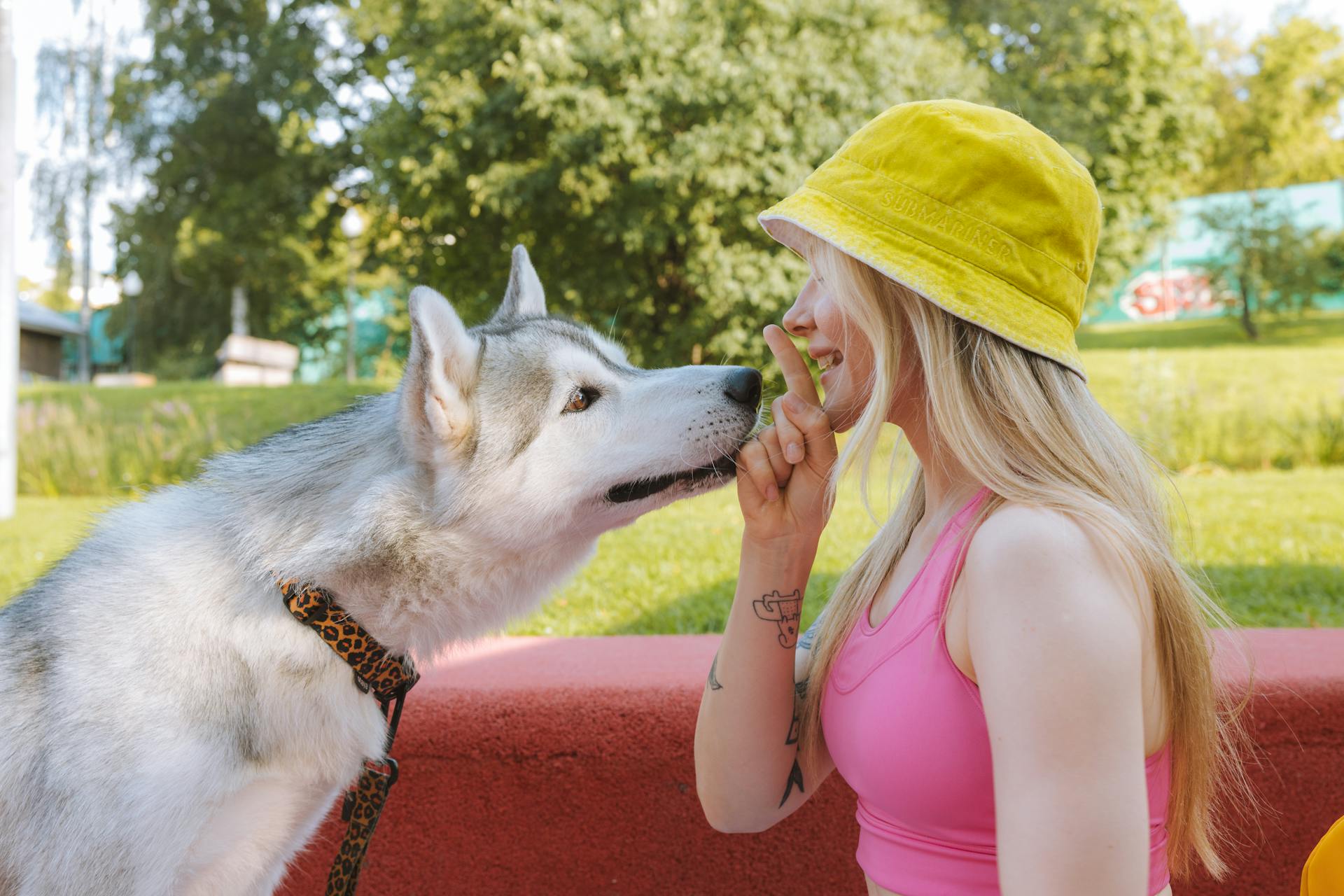
International Hearing Dog Inc. offers free service dogs to individuals who are d/Deaf or hard of hearing, training their dogs to alert them to important sounds in their environment. To be eligible, you must be at least 18 years old, d/Deaf or profoundly and bilaterally hard of hearing without aids, and live alone or with others who are also d/Deaf.
Here are the key requirements for International Hearing Dog Inc.:
- Be at least 18 years old
- Be d/Deaf or profoundly and bilaterally hard of hearing without aids
- Live alone, with dependents, or with others who are also d/Deaf
- Not have other dogs in the home, unless those dogs are retired hearing dogs
- Be willing to participate in online training and quizzes
- Be able to attend 10 days of training in Denver at your own expense
- Be financially, physically, and mentally able to provide for your hearing dog’s care and daily training
Guide Foundation
The Guide Dog Foundation is a wonderful organization that provides free guide dogs for people who are legally blind. They train Labrador Retrievers, Golden Retrievers, Standard Poodles, and Labrador/Golden crosses.
To be eligible for a free service dog from The Guide Dog Foundation, you must be legally blind. You must also live in the United States or Canada and have a stable living arrangement. And, you must need a guide dog to help you remain safe.
Here are the specific requirements to get a free service dog from The Guide Dog Foundation:
If you qualify, you can begin your application online by clicking the "Apply Now" button on The Guide Dog Foundation website.
Project
The Service Dog Project is a wonderful organization that provides Great Danes trained to help with mobility and balance. They offer these service dogs for free, but you'll need to meet their specific criteria to be eligible.
To receive a service dog from the Service Dog Project, you must live close enough to travel to Massachusetts for ongoing training and assessments. This is a crucial requirement, so make sure you're within a reasonable distance.
You'll also need to be between 12 and 70 years old to qualify. This age range is specified by the organization, so it's essential to fall within it.
Another requirement is that you have no more than one dog in your household at the time of application. This means you'll need to consider your current pet situation before applying.
A fenced yard is also necessary, so if you don't already have one, you'll need to make arrangements. This is to ensure the safety of both you and the service dog.
You'll need to spend at least three hours a day in public, which may require some adjustments to your daily routine. This is an important aspect of the service dog's training and your eligibility.
Frequently Asked Questions
Do you need proof for service dog in NJ?
In New Jersey, businesses cannot require proof for service animals, but they can ask if the animal is a service animal. The person with a disability must be in control of the service animal at all times.
How to get a service dog in Kentucky?
To obtain a service dog in Kentucky, contact Pawsability Unleashed, a non-profit organization that provides service dogs to applicants at no charge. Funding for their program is sourced from the community, making their service accessible to those in need.
Sources
- https://lowincomerelief.com/how-to-get-a-service-dog/
- https://mynews13.com/fl/orlando/news/2022/08/06/local-nonprofit-trains-service-dogs-for-families--free-of-charge
- https://www.servicedogcertifications.org/free-service-dog/
- https://www.nyc.gov/site/mopd/resources/service-animals.page
- https://www.putnamservicedogs.org/apply-for-a-service-dog/
Featured Images: pexels.com


